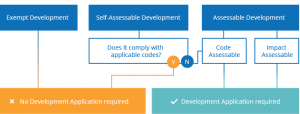*UPDATE: the Planning Act 2016 has commenced since this article was written, refer to updated information on our website by clicking here.
Developments generally fall into one of three major categories, being “self-assessable”, “code assessable” or “impact assessable” under a Council Planning Scheme. These assessments are managed by Councils under the rules and development assessment system contained in the legislation that regulates planning in Queensland, the Sustainable Planning Act 2009 (SPA). The SPA covers the planning instruments against which development applications (DAs) are to be assessed; their assessment; and appeals in the Planning and Environment Court.
In preparing a planning scheme and allocating zones, Council predetermines what types of land uses and other development are appropriate in each of the zones. Development that is anticipated and perceived to have manageable impacts is typically listed as self-assessable or code assessable. Self-assessable development does not require a DA under a planning scheme where it is fully compliant with all the applicable codes identified. Only if a proposal does not comply will it then trigger a DA to enable Council to assess the areas of non-compliance and that DA would be code assessable.

The planning scheme can also trigger a code assessable DA outright, and in those circumstances these types of development are predetermined by Council to be appropriate for an area where complying with the relevant development standards in the identified applicable codes. A code assessable DA does not have to be advertised to the public due to its compliance with local planning provisions. Neighbours and the public can still make a submission to the Council about it, however they have no formal rights of submission or appeal. Councils can only refuse a code assessable DA if it does not comply with the relevant codes and/or there are insurmountable engineering constraints.
Impact assessable applications are determined to have a degree of “impact” that requires a merits based assessment to determine whether they are appropriate in the zone or not. Impact assessable development is not guaranteed approval and a detailed assessment by Council will determine whether the proposal is appropriate or not. For this reason these DAs warrant public notification. This involves advertising the application so members of the community have the opportunity to make a submission within a certain period. These submissions may be in support of, or against, the proposed development. The community also has the right to appeal decisions about this type of DA to the Planning and Environment Court.
Impact assessable DAs, due to the involvement of the wider community through public consultation, are typically more time consuming and onerous for applicants. If community feedback is negative, an impact assessable DA can ultimately end up in Court for judgement. On the other hand, code assessable DAs are fairly straightforward and can be assessed relatively quickly. You can find out more information on the development application process here.
Navigating projects through Council, whether they are self, code or impact assessable, requires intricate knowledge of the relevant planning codes and legislation. Appointing a Town Planner is an essential step to take when investing resources in having a development assessed and most importantly during due diligence relating to any potential property purchase.
Consult Planning has decades of experience dealing with both straightforward and complex DAs. We advocate for our clients and do our utmost to achieve the planning outcome sought in the most efficient manner possible. For further information contact us on 1300 017 540 or office@consultplanning.com.au.







